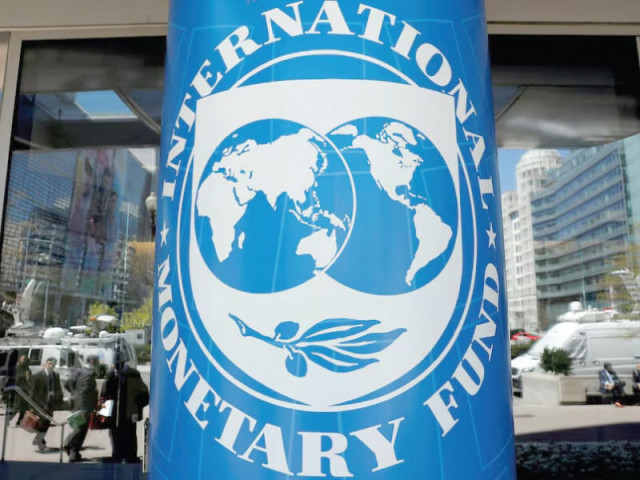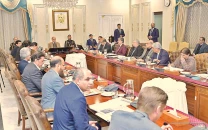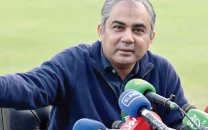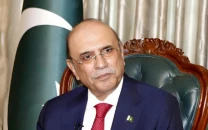IMF huddles with envoys on bailout package
Pakistan shares new pension scheme with global lender

The International Monetary Fund (IMF) on Monday briefed European and American ambassadors on the progress of Pakistan's current bailout package as it extended discussions with the authorities.
The talks, stretching into their third day, were initially slated to conclude on Monday.
The government informed the Fund that it was planning to roll out a new pension scheme in July but challenges remained in its execution. The new pension scheme would reduce the post-retirement benefits of the government employees.
The sources said that the IMF hosted the ambassadors and representatives from at least nine European and Western nations and apprised them about the successes that Islamabad made under the current $3 billion stand-by arrangement (SBA).
The diplomats from the United States, European Union, France, Italy, Germany and Australia were among those who attended the briefing, according to the people privy to these discussions.
The foreign envoys were also told by the IMF that Pakistan showed the intention to express another bailout programme. However, the size and the duration of the loan were not clear at this stage.
The IMF informed the foreign envoys that Pakistan has made significant progress in achieving the programme objectives and there were encouraging results.
The lender also highlighted the challenging areas, mainly the low revenue collection, particularly by the provinces that now necessitate revisiting the National Finance Commission (NFC) award. A foreign diplomat inquired about the IMF’s position on the NFC award.
The people privy to the meeting said that the IMF was of the view that the provinces currently get a large pie of the federal taxes, which leaves no incentive for them to increase their own revenues from sectors like agriculture.
The IMF's position is that when the provincial shares would be reduced they may make efforts to enhance their own revenues.
At the moment, the transfers under the NFC make around 90% of the total provincial income. The Centre transfers 57.5% of its tax collection to the provinces as their share in the NFC.
The Express Tribune reported last week that the IMF urged Pakistan to revisit the NFC award aimed at striking a balance between the resources and the responsibilities of the provinces and the federal government.
During the envoys’ meeting, the IMF expressed concern over low revenues and emphasised that the federal government should increase its collection from real estate, construction and retailers.
On the privatisation issue, the IMF said that the government was making efforts to privatise Pakistan International Airlines (PIA). Three days ago, the Privatisation Ministry informed the IMF that it was planning to invite bids for the PIA privatisation by June.
The ministry was also separately working on a one-year, two-year and five-year privatisation plan for the State-Owned Enterprises (SOEs).
The IMF’s view on inflation was that inflation remained high and there was a need to tame it. During the ongoing parlays, the Fund’s advice to the State Bank of Pakistan was to maintain the tight monetary policy.
As a result, the SBP decided to keep the policy rate unchanged at 22%, despite the core inflation decelerating to 18.1% in February. This has made the life of the bankers easy at the expense of the federal government and the poor taxpayers.
Separately, the US Ambassador Donald Blome on Monday met with Foreign Minister Ishaq Dar. The US embassy said that Blome and Dar discussed a wide range of bilateral issues, “including US support for economic reforms in Pakistan”.
Although Dar has been denied the Ministry of Finance, he still remains relevant and active in the economic matters of the federal government. Prime Minister Shehbaz Sharif has made Dar chairman of a committee overseeing the outsourcing of three international Pakistani airports.
Talks extended
The Ministry of Finance said last Tuesday that the IMF talks would continue from March 14 to 18.
However, the IMF has extended the talks for another day. The sources said that today (Tuesday) both sides would hold discussions on the Letter of Intent to the IMF for the release and approval of the last loan tranche.
The Ministry of Finance spokesman did not comment on the reasons behind the extension. However, an official said that the talks were extended as the discussions could not be concluded within the originally agreed time frame. The IMF’s statement will be released after the successful culmination of the talks.
Pension meeting
The Ministry of Finance on Monday briefed the IMF about its pension reform plan. The IMF was told that the government has decided to implement the new pension scheme from July –the start of the new financial year 2024-25. However, the Fund was told that there could be some hiccups in the smooth rolling out of the new scheme.
The IMF was informed about the major contours of the new pension scheme. The government has a plan to give pensions to the existing employees based on the average of the last three years’ salary instead of giving it on the basis of the last month’s drawn salary. This would reduce the amount of pension.
Similarly, the IMF was told that there is also a proposal to reduce the commutation from 35% of the pension to 25%, which would lower the amount of cash that the retiring employee gets on retirement.
As against the existing list of 16 beneficiaries of a deceased pensioner, there is a proposal to restrict the pension to the widow of the deceased. In case of the death of the widow of the deceased, the next heir would get the pension for the maximum of 10 years.
In case the spouse of the deceased is also a government employee, the spouse would not get the pension, according to the briefing given to the IMF. According to another proposal, any government employee can get only one pension, as against the current practice of getting more than one pension.
Similarly, in case the retired employee is rehired, he or she would be given a choice to either get a pension or a salary. However, this proposal might face resistance from different quarters. The majority of the retired military personnel are rehired.
For this fiscal year, the government has allocated Rs801 billion for pensions, including Rs563 billion for military pensions.


















COMMENTS
Comments are moderated and generally will be posted if they are on-topic and not abusive.
For more information, please see our Comments FAQ